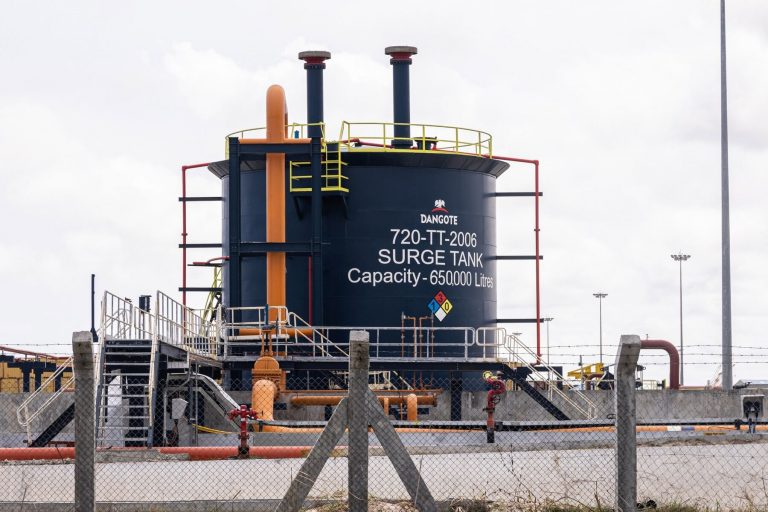
Dangote Refinery has announced it is selling petrol at N960 per liter for ship sales and N990 per liter for truck sales, following a recent pricing controversy buoyed by independent petroleum marketers.
These prices, according to the refinery’s spokesperson, Anthony Chiejina, are aligned with international rates to maintain quality standards, and are intended to be competitive in comparison to import prices.
This announcement was made following claims by the Independent Petroleum Marketers Association of Nigeria (IPMAN), represented by National Assistant Secretary Yakubu Suleiman, that the refinery’s fuel prices are significantly higher than those of other suppliers.
Tekedia Mini-MBA edition 16 (Feb 10 – May 3, 2025) opens registrations; register today for early bird discounts.
Tekedia AI in Business Masterclass opens registrations here.
Join Tekedia Capital Syndicate and invest in Africa’s finest startups here.
Speaking on Arise TV, Suleiman noted the refinery’s pricing as problematic, particularly given recent global crude price declines. He stated, “Last week, Dangote’s price is higher than other places. Because if you can go by the price, the international price of crude has already started coming down. If I could remember, as of last week, he gave N995 per litre, and you have to bring your cargo and load.”
Suleiman pointed out that the added logistics costs for independent marketers further raise the end price of fuel, impacting Nigerian consumers directly.
“How much will you pay for the cargo? And how much will go to the depot? And you expect independent marketers to go and sell it. Can we go and sell? Look, we have to pity Nigerians,” he added.
Dangote Refinery issued a statement on Sunday, defending its pricing model. Chiejina argued that the refinery benchmarks prices against international standards to ensure competitiveness and maintain product quality. He also questioned the quality of any imported fuel that could be sold at lower prices than those offered by Dangote Refinery, suggesting that such products might be substandard.
“If anyone claims they can land petrol at a price cheaper than the price Dangote is selling, then they are importing substandard products and conniving with international traders to dump low-quality products into the country, without concerns for the health of Nigerians or the longevity of their vehicles,” he asserted.
The refinery further claimed that Nigeria’s regulatory authority, the Nigerian Midstream and Downstream Petroleum Regulatory Authority (NMDPRA), lacks the laboratory facilities necessary to detect these low-grade imports, making it challenging to ensure fuel quality in the market.
“Post deregulation, NNPC set the pace by selling PMS to domestic marketers at N971 per liter for sale into ships and at N990 for sale into trucks. This set the benchmark for our pricing and we have even gone lower to sell at N960 per liter for sale into ships while maintaining N990 per liter for sale into trucks,” Chiejina clarified.
Additionally, Chiejina revealed that an international trading company has leased a depot next to the Dangote Refinery, allegedly to blend substandard products intended to compete with Dangote’s offerings. This, he warned, is a move to undermine domestic refining efforts and jeopardizes the country’s aim to boost local production capabilities.
“While we continue with our determination to provide affordable, good quality, domestically refined petroleum products in Nigeria, we call on the public to disregard the deliberate disinformation being circulated by agents of people who prefer for us to continue to export jobs and import poverty,” he added.
The refinery also argued that its pricing is influenced by global trends, similar to other countries that protect domestic industries. Chiejina pointed to the U.S. and European Union’s use of tariffs on certain goods, such as electric vehicles and microchips, to support local production and employment.
The back-and-forth with marketers follows comments from Aliko Dangote himself last Tuesday, in which he emphasized the refinery’s readiness to supply the local market, revealing that it currently has over 500 million liters of petrol in stock. Dangote expressed frustration over marketers’ hesitation to source fuel domestically, questioning why NNPC and other retailers continue to rely on imports.
“So, I am expecting that the NNPC Ltd and the marketers should stop importing; they should come and collect what they need,” he stated, adding that this would leverage the refinery’s 650,000 barrels-per-day output.
Despite Dangote’s assurance of supply, industry reports indicate a gap in delivery. Between September 15 and October 5, the refinery supplied only 148 million liters, significantly less than the 575 million liters sought by NNPC Ltd, according to a report by the NMDPRA. This shortfall has led some industry analysts to speculate that the refinery’s operations may still be stabilizing, a norm for a large-scale facility recently entering production.
Last Thursday, Dangote Refinery also noted that IPMAN had not made any payments for refined products, refuting claims that the marketers were unable to load petrol for days. This dispute underscores broader challenges in Nigeria’s post-deregulation market, where local refiners like Dangote are expected to play an essential role in replacing imports while ensuring fuel affordability.
As the dust settles, questions linger on how Dangote Refinery’s pricing model will affect the local market in the long term, with concerns about the feasibility of relying on a single refinery for nationwide supply. IPMAN has yet to formally respond to Dangote Refinery’s statement, but the disagreement highlights persistent tensions between local production costs and the affordability needs of consumers in a country grappling with high inflation and volatile currency exchange rates.



